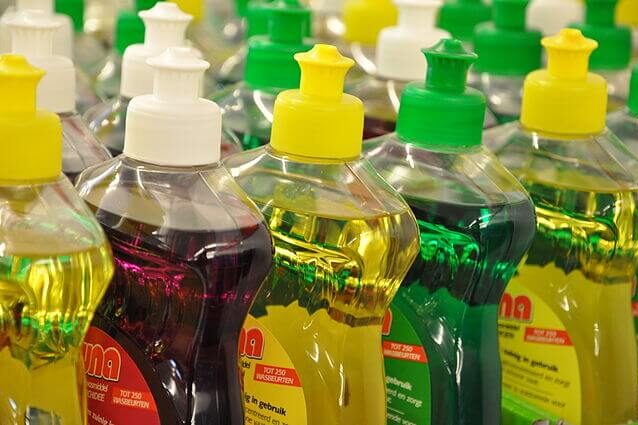
A new report from the thinktank Green Alliance has highlighted how the chemicals used in everyday household items are a hidden source of carbon emissions.
The report urges UK ministers to take a leadership role in a green revolution in chemical manufacturing, to reduce the carbon footprint of consumer products. It states that the production of washing-up liquid and the plastic bottles that contain it is responsible for the same annual carbon emissions as approximately 40,000 cars, while laundry tablets and their breakdown in sewage works emit the equivalent emissions of 600,000 cars a year.
Fossil fuels are often the primary ingredient in many of the chemicals used in everyday products, and they also generate the energy required to produce them. Chemicals are used in over 90% of everyday products, including fertilisers, plastics and paint. Approximately 70% of emissions from UK chemical manufacturers come from burning fossil fuels on site to process chemicals such as ammonia and ethylene.
Green Alliance’s policy analyst, Liam Hardy, has called for the UK government to help manufacturers. He said: “The chemicals used in everyday products are a huge hidden source of carbon emissions. What we need now is for the government to help British manufacturers make their production processes greener.
“This should not only help to reduce our carbon footprint and make the UK a science leader but can also safeguard good jobs in our industrial heartlands.”
The report calls for the government to support the electrification of the chemical sector, improve the reuse and recycling of products, and increase innovation funding to encourage the industry to move away from fossil fuels as a chemical ingredient. The chemical industry aims to reduce emissions by 90% by 2050.
Jonathan Hague, the head of clean future science and technology at Unilever, has urged the UK to address energy and non-energy emissions from fossil fuel-based chemicals if the country is to achieve net zero emissions. He said, “We have set ourselves ambitious goals to halve the greenhouse gas impact of our products per consumer by 2030 … we’re eliminating virgin fossil-derived chemicals from our laundry formulations and innovating new ingredients with low end-of-life emissions. But we know we can’t do it alone,” he said.
——————————————————————————
At Natural World Fund, we are passionate about stopping the decline in our wildlife.
The declines in our wildlife is shocking and frightening. Without much more support, many of the animals we know and love will continue in their declines towards extinction.
When you help to restore a patch of degraded land through rewilding to forests, meadows, or wetlands, you have a massive impact on the biodiversity at a local level. You give animals a home and food that they otherwise would not have had, and it has a positive snowball effect for the food chain.
We are convinced that this is much better for the UK than growing lots of fast-growing coniferous trees, solely to remove carbon, that don’t actually help our animals to thrive.
This is why we stand for restoring nature in the UK through responsible rewilding. For us, it is the right thing to do. Let’s do what’s right for nature!
Support our work today at https://naturalworldfund.com/ and join in the solution!

